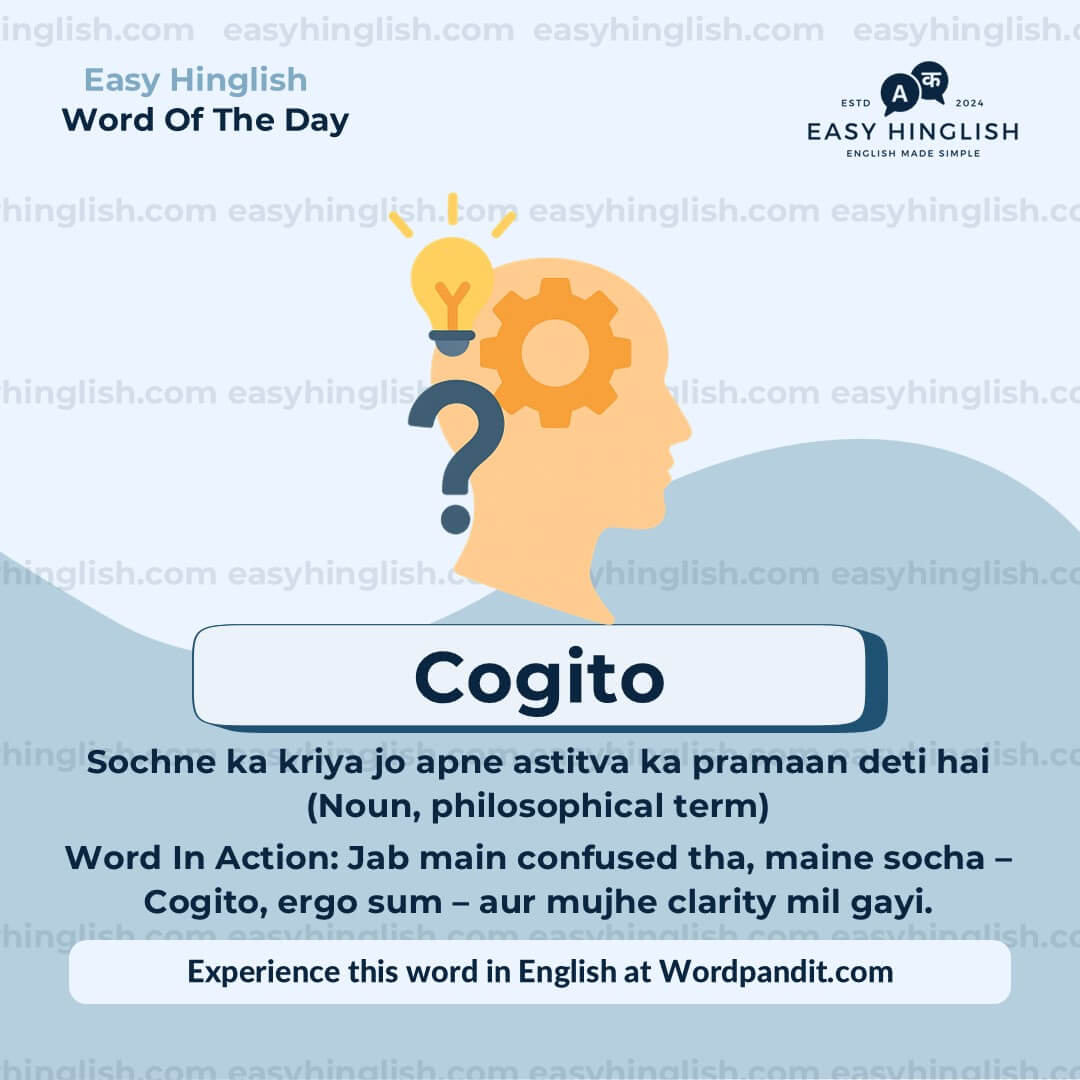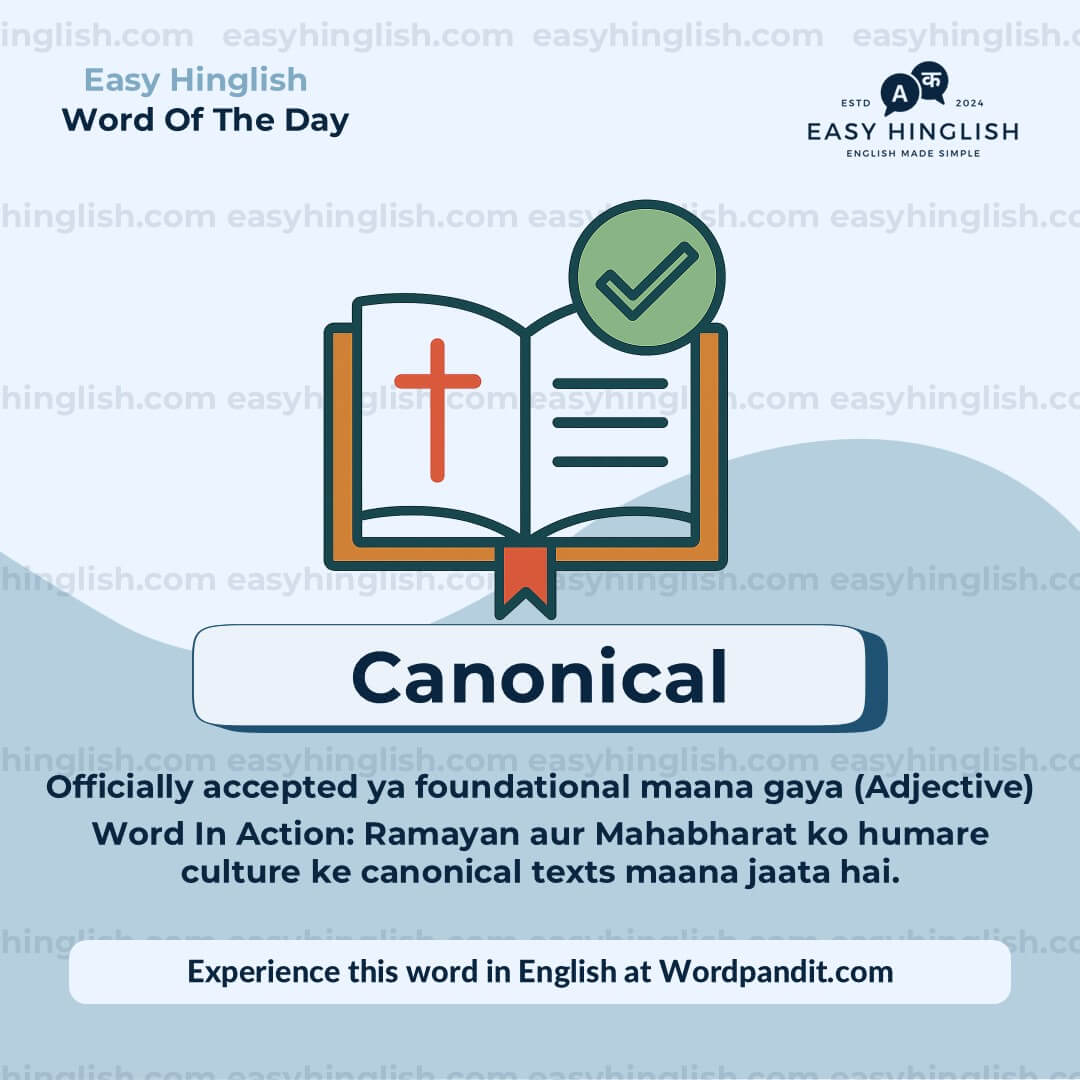Daily Vocabulary International Newspapers aur Publications se Seekho
Wordpandit ke Global Vocabulary Hub ke Saath Apni Vocabulary Expand Karo
Wordpandit par, hum aapko ek truly global vocabulary develop karne me madad karte hain, jo duniya ke sabse respected international publications se li gayi hoti hai. Yeh section aapko naye words se introduce karne ke liye design kiya gaya hai jo global conversations aur trends ko define karte hain.
Global Sources ka Power
Aapko globally sochne aur communicate karne me madad dene ke liye, hum vocabulary curate karte hain world ke top international sources se, jaise:
- The New York Times
- The Washington Post
- BBC
- The Guardian
- The Economist
- Scientific American
- Psychology Today
- Aur bhi bahut saare...
Globally Socho, Competitively Seekho
Hamare daily updates se aap international publications ke naye words seekhoge jo global news aur developments se jude hote hain. Isse aapki vocabulary current bhi rahegi aur globally relevant bhi.
Apni Global Soch Ko Expand Karo
Agar aap international exams ki tayari kar rahe ho, global business communication me excel karna chahte ho, ya sirf apni language skills improve karna chahte ho, toh Wordpandit aapko global level pe grow karne ke liye best resources provide karta hai.
Smart Learning, Global Reach
Hamari learning methodology me global examples, memory aids, aur interactive activities shamil hain, jo naye words ko effectively yaad karne aur real-world me use karne me madad karti hain.
Aaj Hi Apni Global Vocabulary Journey Shuru Karo!
Wordpandit Kyun Choose Karein?
Practical Learning: Aise words seekho jo real-world reading aur communication me aapko sach me kaam aayenge, taaki aapki comprehension aur bolne ki skills improve ho.
Diverse Content: Current affairs se lekar scientific breakthroughs tak, hamare different sources aapko multiple domains ki vocabulary seekhne ka moka dete hain.
Effortless Integration: Wordpandit ko apni daily routine ka part banao. Sirf kuch minute har din dene se aapki vocabulary time ke saath kaafi improve ho sakti hai.
Vocabulary Mastery Tak Ka Aapka Safar
- Regularly hamare Daily Vocabulary section ko visit karo
- Naye words explore karo aur unka context me use samjho
- In words ko apni writing aur bolne ki practice me use karne ki koshish karo
- Jaise-jaise aapke words badhte hain, apni progress ko track karo
Aaj Hi Apni Vocabulary Journey Shuru Karo!
Wordpandit ke saath vocabulary improve karna start karo. Roz thoda effort dalne se aap ek strong vocabulary develop kar sakte ho jo academic, professional, aur personal life me kaafi kaam aayegi.
Yaad rakho, ek naya shabd roz seekhna linguistic limitations ko door karne ka best tareeka hai! Wordpandit ko apni daily learning journey ka sathi banao aur vocabulary excellence ki taraf badho!
WORD-1: Cogito
Sandarbh (Context):
"They believe that finding an African who sees the world in terms of the isolated form of subjectivity made influential by Descartes’s Cogito, ergo sum (‘I think, therefore I am’) is tantamount to proving the existence of indigenous philosophy in Africa. But this is a futile exercise." - Aeon
Vyakhya (Explanatory Paragraph):
"Cogito" ek Latin word hai jo phrase "Cogito, ergo sum" se aaya hai, jiska matlab hai: "Main sochta hoon, isliye main hoon." Ye concept French philosopher René Descartes ne diya tha. Unka kehna tha ki agar hum sab kuch doubt kar sakte hain, to bhi ek cheez jo certain hai wo yeh hai ki hum soch rahe hain—aur sochna hi humare hone ka sabse bada proof hai.
Arth (Meaning): Sochne ka kriya jo apne astitva ka pramaan deti hai (Noun, philosophical term)
Uccharan (Pronunciation): KO-jee-toh
Kathinai Star (Difficulty Level): ⭐⭐⭐⭐ Advanced
Utpatti (Etymology): Latin phrase "Cogito, ergo sum" se liya gaya hai, jo 17th century mein René Descartes ne popular banaya.
Prashant Sir Ke Tathya (Prashant Sir's Notes):
"Cogito" ek basic but deep concept hai jo un students ke liye important hai jo philosophy ya logic mein interest rakhte hain. Yeh modern Western philosophy ka starting point maana jata hai. Jab sab kuch doubtful ho, tab sochne ka act hi hamare hone ka sabse bada saboot hota hai.
Samanarthi & Vipritarthi (Synonyms & Antonyms):
Samanarthi (Synonyms): self-awareness, consciousness, introspection, reflection
Vipritarthi (Antonyms): ignorance, unconsciousness, oblivion
Udaharan (Usage Examples):
- Descartes ka "Cogito" aaj bhi philosophy mein personal identity samajhne ka ek important concept hai.
- Jab bhi use sab kuch uncertain laga, usne "Cogito" ko yaad karke apne hone ka saboot paaya.
Sanskritik Sandarbh (Cultural Reference):
"Cogito, ergo sum" ka zikr film *The Matrix* mein bhi hua tha, jahan reality aur self ka sawal uthaya gaya tha. - Movie Reference
Sochiye (Think About It):
Kya sirf sochne se hum apne hone ka saboot de sakte hain? Ya fir "being" ka matlab soch se bhi zyada kuch hota hai?
Chhoti Kriya (Quick Activity):
Ek short paragraph likho jo "I think..." se shuru ho. Apne hone ya kisi belief ko logically prove karne ki koshish karo—dekho kya tumhara logic Cogito principle par based hai?
Yaad Karne Ka Tarika (Memory Tip):
"Cogito" ko yaad rakhne ke liye "Cognition" ya "Cognitive" words ko yaad karo—yeh sab thinking se related hain. Yaad raho: "Main sochta hoon, isliye main hoon!"
Vastavik Jeevan Me Upyog (Real-World Application):
"Cogito" ka use AI, consciousness aur identity jaise topics mein hota hai. Jab bhi hum self-awareness ya sentience ki baat karte hain—chahe humans mein ho ya machines mein—yeh concept wahan zaroor aata hai.
WORD-2: Ardent
Sandarbh (Context):
"But most damning is that the ardent supporters of the Hatatas are Africanists who are motivated by nationalism rather than an attempt to study the philosophical value of the teachings found in the texts." - Aeon
Vyakhya (Explanatory Paragraph):
"Ardent" un logon ko describe karta hai jo kisi cheez ke liye bahut passionate ya jazbaati hote hain. Ye log apne cause, idea, ya person ke liye puri lagan se jude hote hain. Jaise is sentence mein jo log Hatatas ko support kar rahe hain, unka support philosophical nahi, balki nationalistic emotion se driven hai — aur isi wajah se unhe "ardent" kaha gaya hai. Ye shabd often fiery passion dikhata hai.
Arth (Meaning): Passionate ya intensely enthusiastic (Adjective)
Uccharan (Pronunciation): AHR-dent
Kathinai Star (Difficulty Level): ⭐⭐ Basic
Utpatti (Etymology): Old French "ardant" se, jiska matlab hai "burning"; Latin "ardere" se nikla, jo hota hai "to burn."
Prashant Sir Ke Tathya (Prashant Sir's Notes):
"Ardent" ek strong emotion wala word hai—jab koi kisi cheez ko leke itna jazbaati ho jaata hai ki objectivity chali jaati hai. Ye word positive (jaise ardent love) bhi ho sakta hai aur negative bhi (jaise ardent nationalism). Context pe dhyan dena zaroori hai.
Samanarthi & Vipritarthi (Synonyms & Antonyms):
Samanarthi (Synonyms): passionate, fervent, enthusiastic, zealous, devoted
Vipritarthi (Antonyms): indifferent, apathetic, lukewarm, dispassionate
Udaharan (Usage Examples):
- Woh classical music ka ek ardent fan tha, aur har concert attend karta tha.
- Relief camp ke volunteers ne ardently kaam kiya flood victims ki madad ke liye.
Sanskritik Sandarbh (Cultural Reference):
Jane Austen ki *Pride and Prejudice* novel mein Mr. Darcy apni feelings Elizabeth ko "ardent admiration" ke roop mein confess karta hai—jo dikhata hai ki shabd kitna gehra passion express karta hai.
Sochiye (Think About It):
Kya kisi cause ke liye bahut zyada ardent hona kabhi-kabhi aapki soch ko biased bana deta hai?
Chhoti Kriya (Quick Activity):
Tin aise kaam ya mudde likho jin ke liye tumhe lagta hai tum ardent ho. Socho: kya tumhara passion objectivity mein help karta hai ya usse door le jaata hai?
Yaad Karne Ka Tarika (Memory Tip):
"Ardent" yaad rakhne ke liye imagine karo ek dil jisme aag lagi ho — jab kisi ke dil mein itna strong emotion ho, to use hum "ardent" kehte hain!
Vastavik Jeevan Me Upyog (Real-World Application):
"Ardent" word speeches, news articles aur personal writing mein use hota hai jab kisi supporter, fan, ya activist ke emotional involvement ko highlight karna hota hai. Ye ek powerful word hai jo ya to praise kar sakta hai ya over-involvement ko critique bhi.
WORD-3: Motifs
Sandarbh (Context):
"The EPRDF aimed to reduce all academic disciplines, including philosophy, to mere tools for realising the motifs of revolutionary and developmental democracy. It was against this background that I myself was introduced to the world of philosophy." - Aeon
Vyakhya (Explanatory Paragraph):
"Motifs" ka matlab hota hai baar-baar aane wale ideas, symbols, ya patterns jo kisi story, artwork, music, ya ideology mein repeat hote hain. Inka role sirf decoration ka nahi hota — ye kisi bade theme ya concept ko samajhne mein madad karte hain. Jaise is sentence mein, "motifs" un repeated revolutionary aur developmental thoughts ko refer karta hai jo political system mein constant the.
Arth (Meaning): Baar-baar dikhne wale vichar ya themes (Noun, plural)
Uccharan (Pronunciation): moh-TEEFs
Kathinai Star (Difficulty Level): ⭐⭐⭐ Intermediate
Utpatti (Etymology): French "motif" se liya gaya hai, jiska matlab hai “dominant idea” ya “theme,” aur Latin "motivus" se, jiska arth hai “move karne wala.”
Prashant Sir Ke Tathya (Prashant Sir's Notes):
"Motif" aur "theme" dono closely related hain, par "motif" zyada specific hota hai—jaise ek particular symbol ya line jo story mein baar-baar aata hai. Theme ek broader message hota hai, jabki motif us theme ko reinforce karta hai through repetition.
Samanarthi & Vipritarthi (Synonyms & Antonyms):
Samanarthi (Synonyms): themes, patterns, ideas, concepts, elements
Vipritarthi (Antonyms): digressions, anomalies, deviations, exceptions
Udaharan (Usage Examples):
- Us novel mein lost time aur adhure sapnon ke motifs baar-baar dikhte hain.
- Political speeches mein aksar revolutionary motifs use hote hain jisse log emotionally connect kar saken.
Sanskritik Sandarbh (Cultural Reference):
Shakespeare ke *Macbeth* mein blood aur darkness jaise motifs story ke themes — jaise guilt aur ambition — ko aur strong banate hain.
Sochiye (Think About It):
Media ya politics mein baar-baar repeat hone wale motifs humari thinking ko kaise influence karte hain?
Chhoti Kriya (Quick Activity):
Apni favorite book, movie ya speech yaad karo. Usme koi ek motif identify karo jo baar-baar aata hai aur batayein uska kya matlab hai.
Yaad Karne Ka Tarika (Memory Tip):
"Motif" ko "motive" se jodo — jaise motive kisi ka action drive karta hai, waise hi motif story ka meaning ya feeling drive karta hai.
Vastavik Jeevan Me Upyog (Real-World Application):
Literature, cinema, aur political speeches analyze karte waqt motifs pe dhyan dena bahut important hai. Ye repeat hone wale elements deeper meanings ko samajhne mein madad karte hain, ya kabhi-kabhi propaganda ka hissa bhi ho sakte hain.
WORD-4: Indigenise
Sandarbh (Context):
"Mennasemay, in his creative engagements with Ethiopian history, has tried to demonstrate the need for Ethiopian political theory to indigenise the universal values ideas of democracy." - Aeon
Vyakhya (Explanatory Paragraph):
"Indigenise" ka matlab hai kisi bahari concept ya system ko local culture, traditions, aur needs ke hisaab se adapt karna. Jaise agar democracy ek Western idea hai, to usko Ethiopian context mein fit karna—wahan ki history, values aur samajik structure ke mutabik—us process ko hum indigenisation kehte hain. Yeh blindly kisi idea ko copy karne ke bajaye, usse apni identity ke saath align karne ka tareeka hai.
Arth (Meaning): Kisi cheez ko local ya indigenous culture ke hisaab se dhalna (Verb)
Uccharan (Pronunciation): in-DIJ-en-ize
Kathinai Star (Difficulty Level): ⭐⭐⭐ Intermediate
Utpatti (Etymology): “Indigenous” (jo local ya native ho) + verb-forming suffix “-ise” (British usage; American mein “-ize” bhi hota hai)
Prashant Sir Ke Tathya (Prashant Sir's Notes):
"Indigenise" ek important concept hai postcolonial studies aur political philosophy mein. Ye word batata hai ki kisi bhi foreign model ko bina soche-samjhe accept karne ke bajaye, humein usse apne cultural aur societal context ke hisaab se re-shape karna chahiye. Ye education, law, aur governance mein bahut use hota hai.
Samanarthi & Vipritarthi (Synonyms & Antonyms):
Samanarthi (Synonyms): localise, adapt, naturalise, contextualise
Vipritarthi (Antonyms): globalise, standardise, universalise, impose
Udaharan (Usage Examples):
- School curriculum ko indigenise karne ki demand badhti ja rahi hai, jisme local language aur history include ho.
- Legal systems ko native communities ki values ke hisaab se indigenise karna zaroori hai, kehna hai postcolonial scholars ka.
Sanskritik Sandarbh (Cultural Reference):
Bharat mein Mahatma Gandhi ne education aur governance ko indigenise karne ki baat ki thi, jise unhone “Swaraj” ka naam diya — jisme apni cultural identity ko reclaim karne ki koshish thi.
Sochiye (Think About It):
Kya universal ideas jaise democracy tabhi effective hote hain jab unhe har society ke cultural aur historical context ke hisaab se indigenise kiya jaye?
Chhoti Kriya (Quick Activity):
Ek global idea chunno (jaise education, health, ya justice) aur socho: tumhare local area mein usko kaise indigenise kiya ja sakta hai?
Yaad Karne Ka Tarika (Memory Tip):
"Indigenise" yaani "indigenous" banana — yaad rakho: jab koi global idea ko "customise for culture" karte hain, to hum usse indigenise kehte hain!
Vastavik Jeevan Me Upyog (Real-World Application):
Indigenise ka concept aaj kal policy-making, education, aur architecture mein bahut use ho raha hai. Jab bhi kisi foreign system ko local relevance dena ho, wahan yeh word apply hota hai.
WORD-5: Canonical
Sandarbh (Context):
"He did not want to identify with a relativist discourse that loses sight of the interconnections that are found among different conceptions of truth, and he strongly believed in the benefits of a cross-cultural examination of the Hatatas, as well as that of canonical Western philosophers like Descartes and Kant." - Aeon
Vyakhya (Explanatory Paragraph):
"Canonical" un cheezon ko describe karta hai jo kisi field mein officially accepted, classic, ya foundational maani jaati hain—jaise literature, religion, ya philosophy mein kuch texts ya authors. Jaise Descartes aur Kant ko "canonical philosophers" kehna isliye hai kyunki unka kaam Western philosophy ka core part maana jata hai. Canonical cheezein wo hoti hain jo syllabus ka main part hoti hain ya jinhe scholarly community ne accept kiya hota hai.
Arth (Meaning): Officially accepted ya foundational maana gaya (Adjective)
Uccharan (Pronunciation): kuh-NAW-nih-kul
Kathinai Star (Difficulty Level): ⭐⭐⭐ Intermediate
Utpatti (Etymology): Late Latin "canonicalis" se, jiska matlab hai "according to rule," aur "canon" se, jiska arth hai "rule ya standard."
Prashant Sir Ke Tathya (Prashant Sir's Notes):
"Canonical" word academic discussions mein commonly use hota hai, jab hum un texts, writers ya ideas ki baat karte hain jo "standard" ya "must-study" maane jaate hain. Dhyan rahe: canonical ka matlab "correct" nahi hota, balki "accepted" hota hai. Ye word marginal ya alternative ideas ke opposite use hota hai.
Samanarthi & Vipritarthi (Synonyms & Antonyms):
Samanarthi (Synonyms): standard, authoritative, accepted, classical, established
Vipritarthi (Antonyms): unorthodox, nontraditional, marginal, rejected, controversial
Udaharan (Usage Examples):
- Shakespeare ke plays English literature mein canonical maane jaate hain.
- Professor ne yeh sawal uthaya ki philosophy ke canonical texts mein kuch voices exclude kyun ki gayi hain.
Sanskritik Sandarbh (Cultural Reference):
Comics aur fandoms mein "canonical" ka matlab hota hai officially story ka part. Jaise *Star Wars* ki original trilogy canonical hai, lekin kuch purani books "non-canon" kehkar exclude ki gayi hain.
Sochiye (Think About It):
Kya canon ko flexible hona chahiye taaki naye aur pehle ignore kiye gaye perspectives bhi include kiye ja sakein? Ya isse uski authenticity kam ho jaayegi?
Chhoti Kriya (Quick Activity):
Kisi bhi field (literature, philosophy, film) mein 5 canonical works list karo. Fir ek aisi book ya author likho jo tumhare hisaab se canon mein hona chahiye—aur kyu?
Yaad Karne Ka Tarika (Memory Tip):
"Canonical" yaani "canon" ka part—matlab officially accepted. Socho canon jaise syllabus ya rulebook, aur canonical ka matlab hua "jo usme likha gaya hai."
Vastavik Jeevan Me Upyog (Real-World Application):
Kisi bhi subject ko samajhne ke liye ye jaana zaroori hota hai ki us field ke canonical works kya hain. Isse academic foundation strong hoti hai—aur phir aap dekh sakte ho ki kaunse voices ignore hue hain, aur kyun.













